
Opinion
Star Wars: I started with Episode IX and tell you what happens in I to VIII
by Carolin Teufelberger

Chemistry teacher Walter White is diagnosed with cancer and builds a crystal meth empire to make sure his family has enough money after he dies. «Breaking Bad» is touching, surprising and fascinating. What is it that makes this series so incredibly good even twelve years after it was released?
From rags to riches: it’s the classic American dream. The protagonist teaches chemistry at a high school and becomes the head of a drug ring. He makes millions and millions. «Breaking Bad» is world-famous, a classic and a groundbreaking part of TV drama history.
Spoiler alert: if you haven't yet seen the series, you're continuing to read from here at your own risk.
Walter White (Bryan Cranston), a high school chemistry teacher, finds himself financially ruined after being diagnosed with cancer and going through expensive surgery and chemotherapy. To keep himself and especially his family afloat after his death, he enters the drug business. From the procurement of raw materials to rival gangs and storing a huge amount of cash: Walter hasn’t chosen an easy solution to provide for his family. The struggle with himself, an unsuspecting family and the threat of death from stage IIIA cancer are just some of the challenges he faces in everyday life.
Here’s my attempt to find out why the series is so gripping and how it’s changed my view on series – even though I saw it twelve years after everyone else.
The beginning of «Breaking Bad» couldn’t be more different from its storyline. Many multi-season series jump right into the middle of events, catch up on things in retrospect and let the final episodes reveal how everything turns out. «La Casa de Papel» or «Lost», for example. Some of them – «Blacklist» comes to mind spontaneously – leave questions unanswered, while others – «Dark», for instance – never tell viewers where on the timeline the story is taking place. Only a few series make use of the classic linear narrative method.
«Breaking Bad» is one of them.
The series begins at the beginning and ends at the end. As a viewer, I experience Walter White up close. I get to know him as a confused chemistry teacher and get to love him as a worried family man. I suffer with him when he’s diagnosed with cancer shortly after his birthday. I'm there when his brother-in-law Hank tells him about the easy money in the meth business. I try to help him with Jesse and his drug withdrawal. And I cry as the series and my journey at Walt's side ends.
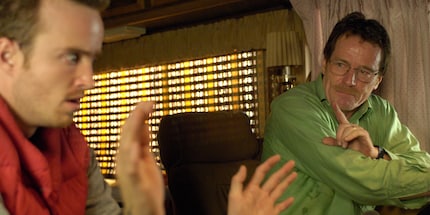
I hate only finding out half a year later why the shady guy was standing on that very street corner. That must have been why I wasn’t captivated by the series the first time I attempted to watch it. About ten years ago, I watched an episode from season three. After almost 50 minutes, I had no clue what I’d just seen. That was it. I didn’t keep watching. I should have given producer Vince Gilligan a second chance. I know that now because I know that he did everything right with «Breaking Bad».
Why I came across this gem twelve years after everyone else? Maybe because it doesn't leave countless questions unanswered after the first two episodes – which is what other great series did at that time. Did the series seem too uncool at the time? Or was I too uncool for the series? I don't know. But today I know that «Breaking Bad» with Bryan Cranston alias Walter «Heisenberg» White is the best series I've ever seen.
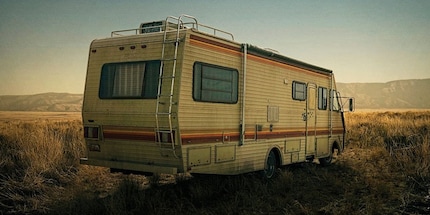
I never thought I could imagine Bryan Cranston playing any other role than Hal from «Malcolm In The Middle», the scatterbrained family man, who’s under his wife’s thumb and constantly trying to deal with his three crazy kids’ mischief. In my mind, Cranston has always been Malcolm's dad and I didn’t want him to be anyone else. Then I watched «Breaking Bad» and Heisenberg turned my world upside down. After spending five intense seasons with Walter White, I no longer know what to believe: is Bryan Cranston Walter White or is Walter White Bryan Cranston? No sign of Hal.
This performance is inhuman. Nothing Cranston says or does seems exaggerated, unnatural or forced. I believe every word Walter White says, every tear and every cough. I don't know how, but this isn’t fake, it's real. I saw Joaquin Phoenix as a Joker and was awed and thought I’d never forget him. Until Walter White steamrolled this memory with his horrible Pontiac Aztek.
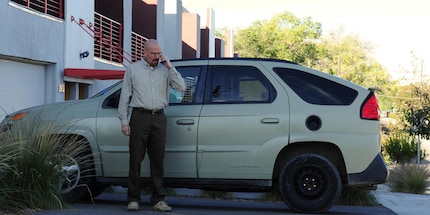
It’s a terrible fate: shortly after his birthday, Walter White finds out that he has stage IIIA lung cancer. He needs to have surgery and chemotherapy, but the family man from a humble background can’t afford it. His job as a chemistry teacher at a high school in Albuquerque, New Mexico, doesn't earn him enough to pay his medical bills and also provide for his family. By coincidence, he learns from Hank, his brother-in-law and DEA agent, that there’s a lot of money to be made with crystal meth – until jail calls, Walter's wife's brother emphasises.
When Walt is allowed to join Hank at a drug bust, he sees one of his former students fleeing the scene. He grabs the chance and takes the first of many steps into a world he’d only known from television before. Is it really possible to be so desperate that producing and selling drugs is the last resort? If I hadn't witnessed every step of Walter’s downfall, I wouldn't have believed it.
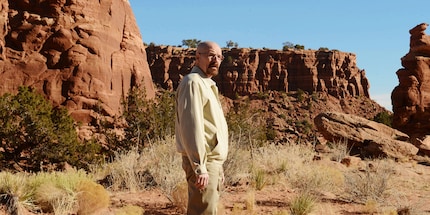
Watching the series is an emotional rollercoaster ride, in synch with the rollercoaster of Walter’s life. I feel for him, even if I could never identify with him. I’m devastated when the poor guy finds out about his incurable disease almost on the day of his birthday – although I already knew at that time that he would go on to make a fortune as a meth producer.
How do you do that, Cranston?
It takes a lot to keep all this secret from your family. Not because it's illegal. Not because his criminal status means that cancer is suddenly only the second most dangerous thing in his life. It’s because your family are the people you can trust to tell everything, for better or worse. But Walt decides to go through everything alone. Do I hate him when he starts treating his wife more and more badly? When he admits to having continued cooking meth because he was the best at it, not because he was making money for his family? Of course I do. But I understand him. And I forgive him.
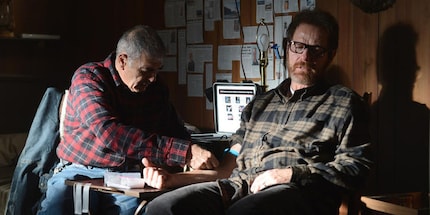
Walter White is more than half of what makes «Breaking Bad» great. But the series isn’t only outstanding thanks to Cranston. Aaron Paul alias Jesse Pinkman also gives a world-class performance. I didn’t count how many times I wanted to pull the guy off his filthy couch, put him under the cold shower and yell, «Get your shit together, man!».
At first, I felt sorry for him. He was a poor young guy, dragged into disaster by Walter White. He takes Walt's beating and learns the hard way. But the longer the series lasted, the better I understood Walt's strict leadership. When Mike takes Jesse under his wing, Jesse also has to suffer. Both Walter and Mike mean well and act in Jesse's interest. But a drugged out junkie, he doesn’t have a clue. I caught myself several times screaming at the telly: «Why, Jesse, why?»
Aaron Paul also managed to make me shed a tear of joy in the final scene as he races through the bars into freedom.
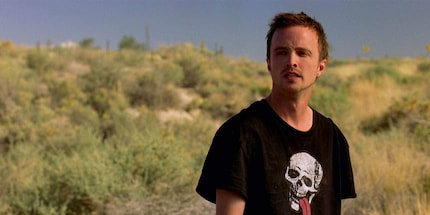
Not only the two main actors in «Breaking Bad» are outstanding. The performance by Tuco Salamanca (Raymond Cruz) as a crazy gang boss? Priceless. Or Tuco's Uncle Héctor (Mark Margolis)? All the scenes with Gustavo Fring (Giancarlo Esposito) in the old people's home, when he deliberately wets his pants during police interrogation? Unbeatable. I don’t think I’ll ever forget the sound of his bell. He sits in his wheelchair and doesn’t speak a single word – but that doesn’t matter. I always know what he wants to say.
Hank Schrader's (Dean Norris) performance is also unforgettable: from the moment he survives the terrible shoot-out in the parking lot and gives up on himself when he finds out he’ll never walk again. As he, a seasoned DEA officer, realises that his life will never be the same again and isn’t prepared to leave the hospital. As his wife tricks him and gets him home. As he turns down the promotion that would have brought him money and fame. Why? Because he can’t stop thinking about hunting down the ominous Heisenberg. His look when he realises that Walt is the one he's been after all along. The looks they exchange in Hank's garage – I get goose bumps just thinking about it.
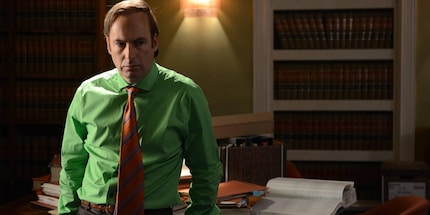
Apart from the cast, it's the little things that make «Breaking Bad» unique. Something inconspicuous, but something I couldn’t take my mind off throughout the whole series is the name of Walter's son (RJ middle). Which father calls his son Walter Junior? Nobody does this today and nobody did twelve years ago. When the boy suffering from infantile cerebral palsy suddenly calls himself Flynn because his father is acting strangely, I suddenly understand. Vince Gilligan, you devious genius. His name is a statement. The father gives the family his last name and if the son even gets the same first name, there’s no more misunderstanding about who belongs where. This shows again when, despite differences, Walter Junior stands by his dad when his parents separate. No film or series has ever managed to shake me with something as simple as a name.
The lottery ticket that Walt buys in the fifth season is another example of this genius. The numbers he plays are the coordinates of where he has buried seven barrels filled with eight million dollars cash in the desert. It’s a lottery ticket with wrong numbers. A blank that still leads to big money. They’re actually the coordinates of the Albuquerque Film Studios.
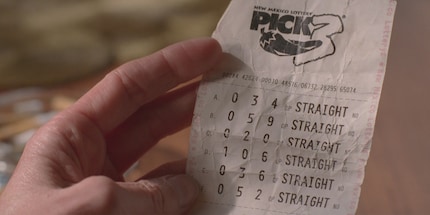
I was also impressed with the cinematography. I'm not referring to the fact that «Breaking Bad» was shot on 35 mm analogue film, which is very unusual for a TV series. What impressed me was the use of the camera perspective. Again and again, producer Gilligan lets the camera become an inanimate object or a character by capturing their point of view. It becomes a tub Gale loads methylamine into, the ground Walter is digging up or the table top Jesse is snorting a line from. Regardless of the object or location, this perspective adds charm to the series.
I’m more attentive and take a closer look if I’m surprised to see a black-brown screen in front of me that suddenly clears and I notice I’m in a hole that Heisenberg is digging up. If Walt was shown from the front or the back while he’s digging a hole with a shovel, I’d see the same action, but I’d feel completely different. It’s a case of seeing a man digging a hole in the desert versus me being dug up by a man in the desert. I see daylight, I'm directly involved, I look in this man’s eyes and not just over his shoulders. It’s a small but important difference.
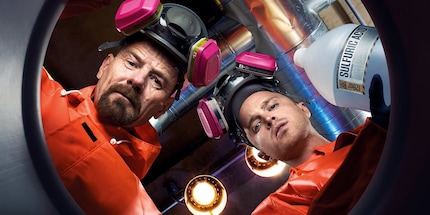
The point I’m making? There's more to it than what I just wrote. My lines don’t even begin to explain how incredibly good «Breaking Bad» is. Walter White and Co. are like an iceberg: nine tenths of the action takes place beneath the surface. Nevertheless, I feel better now that wrote down how much this series captivated me. You get it? Let me know by commenting below. You don’t get it? Watch «Breaking Bad».
Header image: TMDB.org/000000
When I'm not stuffing my face with sweets, you'll catch me running around in the gym hall. I’m a passionate floorball player and coach. On rainy days, I tinker with my homebuilt PCs, robots or other gadgets. Music is always my trusted companion. I also enjoy tackling hilly terrain on my road bike and criss-crossing the country on my cross-country skis.
This is a subjective opinion of the editorial team. It doesn't necessarily reflect the position of the company.
Show all